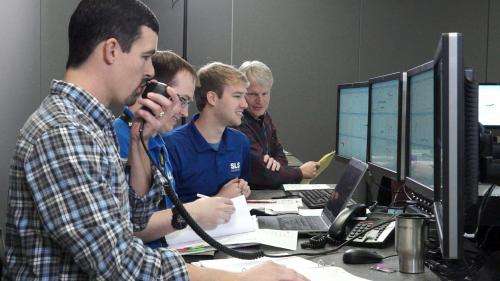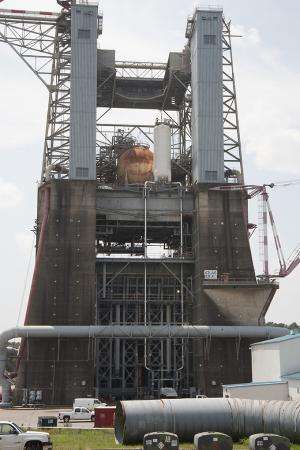Anti-geyser testing completed for SLS liquid oxygen tank

Goodbye, geysers! NASA engineers have successfully finished anti-geyser testing for the liquid oxygen tank that will help fuel the agency's new rocket, the Space Launch System, on the journey to Mars.
More than 120 hours of anti-geyser testing have been completed on a full-scale, 40-foot replica of the SLS liquid oxygen tank feed system—which will be housed in the rocket's core stage—at one of the test stands at NASA's Marshall Space Flight Center in Huntsville, Alabama. The core stage, towering more than 200 feet tall with a diameter of 27.5 feet, will store cryogenic liquid hydrogen and liquid oxygen that will feed the vehicle's RS-25 engines.
"Geysering occurs when heat enters the liquid oxygen feed system, causing the liquid to boil and form large oxygen gas bubbles that rapidly expel," said Chad Bryant, propulsion manager in the Stages Office at Marshall, where the SLS Program is managed for the agency. "This rapid expulsion of boiling liquid can momentarily displace large volumes of heavy liquid that crash back down, causing a damaging hammer effect on the system.
"One of the largest risks with a liquid oxygen feed system of this scale is the potential of creating a geyser—that's why this kind of testing is so important," he added. "This gives us the confidence that the operations we have in place for propellant loading, conditioning and draining will successfully suppress geysers in the system during flight vehicle operations."
Those operations include using helium. The system is filled and thermally conditioned by pumping liquid oxygen up the engine feed lines and into the tank, allowing heat to escape up and out the top of the tank vent. As liquid level rises in the tank, helium is injected into the feed lines, introducing fluid circulation throughout the liquid oxygen system. This circulation is the key to maintaining uniform fluid temperature and eliminating localized propellant heating. "We've used enough liquid oxygen on the test article to fill the SLS oxygen tank eight times—it's very thorough testing," Bryant said.
Data from the test series will be used in the development and demonstration of the liquid oxygen procedures for SLS core stage green run operations at NASA's Stennis Space Center near Bay St. Louis, Mississippi, and the first flight of the rocket from the agency's Kennedy Space Center in Florida. Green run testing of the SLS core stage is the first time the RS-25 engines are assembled into a single configuration with the core stage and fired at nearly full power.
"Anti-geyser testing really provided valuable insights into system-specific behaviors and data for model validation," said Jacob Parton, anti-geyser test conductor. "Building the test article had its challenges, but testing went quite well. The NASA and Boeing teams did a fantastic job."

The Boeing Company of St. Louis is the prime contractor for the SLS core stage, including its avionics. The test series began in August and wrapped up in late January.
The first flight test of the SLS will feature a configuration for a 70-metric-ton (77-ton) lift capacity and carry an uncrewed Orion spacecraft beyond low-Earth orbit to test the performance of the integrated system. As the SLS evolves, it will provide an unprecedented lift capability of 130 metric tons (143 tons) to enable missions even farther into our solar system.
More information: For more information on SLS, visit www.nasa.gov/sls
Provided by NASA




















